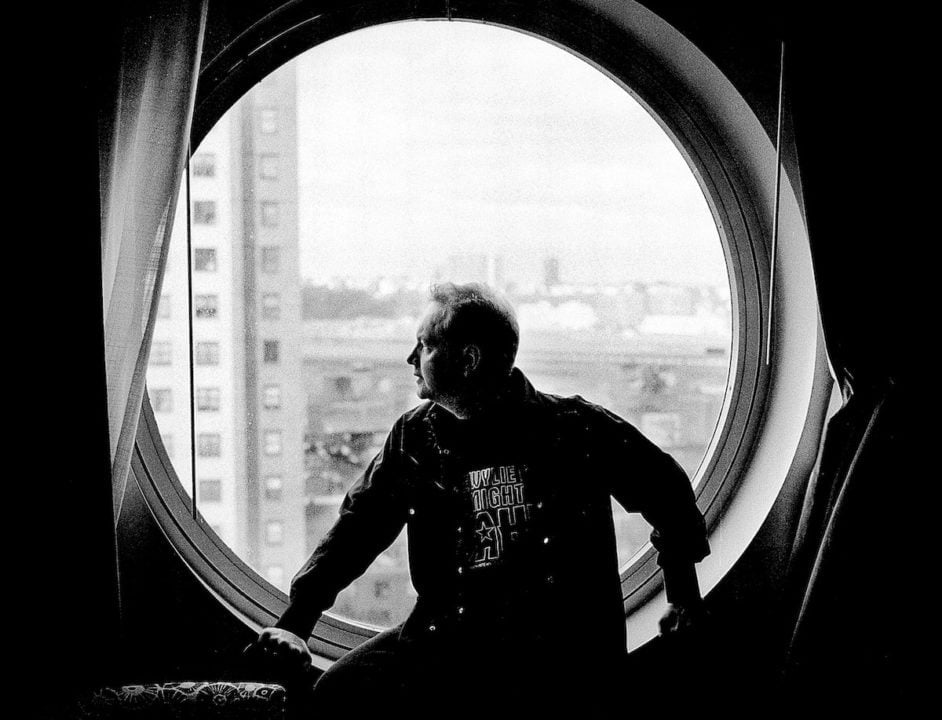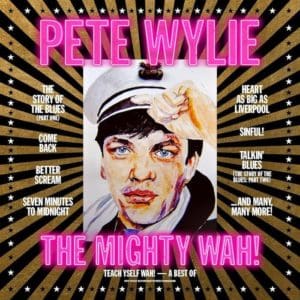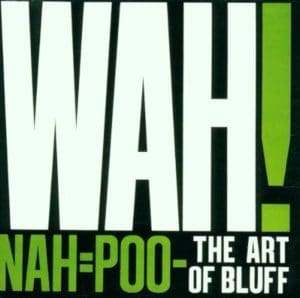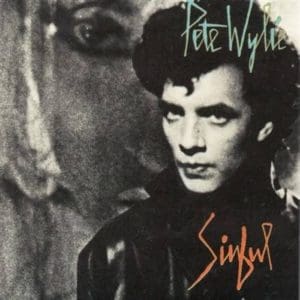
Image © Josh Cheuse
Pete Wylie reflects on his career as a pop maverick
One of the great mavericks of alternative pop, it’s taken 40 years for Pete Wylie to create a definitive guide to his singular worldview. Since starting out alongside Ian McCulloch, Julian Cope and Pete Burns in Liverpool’s famed late-70s Eric’s scene, via his Wah! collective Wylie has created many fabulous variations on meaningful pop. As he now tells us: “I ducked out every time it looked like I was getting a following.”
“This house is called Disgraceland, for obvious reasons.” Pete Wylie guides his laptop camera to give Classic Pop a tour of the living room of his home in Liverpool. It’s a riot of colour, impossible to keep track of the collection of books, Funko Pop dolls and memorabilia on the shelves. There’s a painting of the singer by Pete Townshend on the wall. More of that later.
After first sitting on his remote control – “Don’t suppose you want to watch Doctors?”, asks Wylie as the BBC1 daytime soap promptly starts up – the born raconteur spends the next 90 minutes recounting a life in service to pop music. “If all I had to do was music, I’d be fine,” summarises Wylie of his approach to life. “Some stupid person decided I have to live a whole life as well. Really, that’s the hard part for me.”
An Audience With
That interviewing Wylie is more like being entertained in An Audience With, a performance full of one-liners and unlikely yet plainly true tales from the periphery of the mainstream, will be no surprise to anyone who’s seen Pete – or any of the variants of his Wah! band name – in concert. “I’ll out-heckle anyone who tries to heckle me at the live shows,” he grins. “I talk, joke, mess around. People have told me: ‘That was brilliant. It’s a shame you had to play the songs in between.’”
There’s a serious side to Wylie’s mischief. During lockdown two years ago, he was diagnosed with ADHD. “The diagnosis explains a lot,” Pete considers, whose welcoming humour softens his burly presence. “People have told me: ‘Well, obviously you’re ADHD,’ but they’re just going on the tabloid headlines about what it means. It’s hard work a lot of the time. I can see how ADHD could cripple people, because at times it’s crippled me. But it’s been alright for me in the long run. I’ve achieved things that I’m chuffed about and lost things I might have had.”
He believes his condition might be part of the reason he became a musician: “The best place if you’re neurodivergent is the music business. People don’t notice it there. So many artists that I love were neurodivergent: Syd Barrett, Jimi Hendrix…
Being Weird
“Being weird wasn’t a disadvantage. This business gave us some leeway. I’m not sure how helpful that was at times, but being weird wasn’t something that I particularly had to tackle.”
Where Wylie feels he was definitely fortunate was coming of age in Liverpool in the late 70s, when the legendary club Eric’s was starting up. As a guitarist, Wylie’s first band, Crucial Three, was with Ian McCulloch and Julian Cope. His next, The Mystery Girls, featured Cope and Pete Burns. “I always wanted to be the guitarist, not the singer,” Wylie insists. “It was only when I left The Mystery Girls that I decided to give it a go.”
Wylie knew straight away that Burns would be a star, after first seeing the future Dead Or Alive singer with his wife Lynne at a Sex Pistols gig. “Pete and Lynne were always a team,” recalls Wylie. “At first you were terrified of them, then you were in awe of them, then you wanted to know them.”
He cites Eric’s owner, Roger Eagle, as key to helping the city’s diverse talents gel, stating: “Anyone who Roger thought had something about them, he’d encourage us to get together. I don’t think I’d have had the organisational skills to get a band together without Eric’s. We’d work together one week, hate each other the week after, form a different new band with the same people the week after that. Nothing was off the cards.”
Better Scream
As a guitarist, Wylie considered his main local competition to be Ian Broudie, then of Big In Japan with Holly Johnson and Bill Drummond, the latter still a friend. Wylie laughs: “Every time Bill comes to Liverpool, he tells me: ‘You’re still trying to be the best guitarist in Liverpool, but you can’t be.’ It’s a game – we both know Broudie is best. Bill loves to poke me, and I love having to defend myself.”
Eventually, Wylie fronted Wah! Heat, releasing influential indie debut single Better Scream in 1979. There have been endless variations of the Wah! name since. “I wanted a name that didn’t tell anyone of the nature of our music,” he reasons. “We got ‘Wah!’ from Prince Far I records, and at our first gig loads of rastas turned up. I love Shambeko! Say Wah! as a name, because people are still puzzled by it, and Wah Bloody Wah, which was my version for people going on about the name. If you look at the original version of The Story Of The Blues, it’s as ‘JF Wah.’ Obviously, it’s got a resonance with John F Kennedy – but it also stood for ‘Just Fucking Wah’.”
In honour of John Peel, who named The Story Of The Blues and Come Back as his singles of the year in 1983 and 1984, the most well-known version, The Mighty Wah!, has stayed constant since the DJ’s death in 2004.
Huge Personality
A UK No.3, Wylie cheerfully accepts that The Story Of The Blues is one of his best. “It’s a big example of wanting to write songs that people going through hard times could relate to,” he says. “It was a big change in how I wrote. It showed I was into Motown as much as I was into Pere Ubu and Gang Of Four.”
Yet Wylie sabotaged the follow-up single, Hope, remembering: “I love Hope but, when we went on The Tube, just to be contrary we didn’t play it. Instead, we did our least commercial song, Silver And Gold, which was virtually arthouse and has never even been released. It was my way of saying: ‘You don’t own me.’”
Around the same time, Wylie rejected supporting U2 on the US tour that culminated in their breakthrough Under A Blood Red Sky live album. “Getting to America sounded great and I got on with U2,” shrugs Wylie. “Then my manager was told: ‘We’ve tentatively booked a hundred dates’ and I immediately went ‘Fuck that!’ Not because it was hard work, that’s just not the kind of band I wanted to be.”
As much as Wylie’s innate melodic gift and huge personality mean he should have been a bigger star, he’s aware his contrary streak cost him commercially. “A lot of friends in bands, once they found their style, they continued doing that,” he rationalises. “Some of them still tour and have a following. But I ducked out every time it looked like I’d get a following. I never stopped writing or demoing, but I wasn’t sure why I was making records. So I just stopped releasing them.”
Emotional Impact
There are only seven albums in Wylie’s catalogue, and pop music will always be too important to him to compromise. He also believes his desire to write pop “is probably an ADHD thing,” as he continues: “Music has different neural triggers to me than most people. The way I record music is to try to share the emotional impact music has on me. I want you to feel the same as how I feel when I hear Life On Mars? or You’ve Lost That Lovin’ Feeling. I’ve got to make it clear that it matters, and I try to find a way to concisely articulate it to people.”
That passion for the effect music can have on people means it was doubly galling to Wylie that, during the 80s, he was sometimes dismissed as a ligger for enjoying the company of musicians.
The ‘L’ word is a tag Wylie raises himself, explaining he enjoys being sent old reviews by fans online, though they sometimes make him despair. “When I lived in London, I wasn’t any different than when I’d see mates in Liverpool,” he insists. “I had a fantastic time, hanging out with George Michael and meeting people I loved, like Keith Richards. I met Prince, which I wouldn’t have done if I’d been in a pub in Kirby.”
Music That Matters
Wylie’s other big encounter with the mainstream arrived in 1986, when the title track of fourth album Sinful reached No.13. It sounded as ambitious as its aims, which Wylie rattles off as: “I wanted Sinful to have the power of The Clash, the sound of Giorgio Moroder and the passion of The Four Tops. It’s got a Philip Glass section in it, too, which not many people realised. Philip Glass heard Sinful and apparently he didn’t mind it at all. He decided not to sue me anyway, which is something.”
If Wylie’s musical output is small but perfectly formed, being signed to numerous record labels means it’s taken until now to assemble his work together. Coinciding with a new tour starting in February, a first thorough compilation, Teach Yself Wah!, is being released.
Having studied French at university in 1976, as well as learning Latin and Ancient Greek (“I realise that goes against my ebullient image”), Wylie sees his music as something that can similarly be studied. “Most people only know bits about me,” he muses. “There are indie heads who only know the early singles, then there’s the fans of The Story Of The Blues.They’re both only versions of me and there are a lot of holes to my story. I want people to have a fuller version of my story that gets rid of some of the clichés about me. I’m not saying: ‘You must learn this.’ It’s more: ‘Here you are, here’s a focused selection, now make your own mind up.’”
Teach Yself Wah!
The sleeve of Teach Yself Wah! is of a 1983 painting by Pete Townshend of Wylie in a sailor’s cap, after the pair met on Janice Long’s Radio 1 show. “Pete was both my guitar guru and my guru for writing pop songs that talked about something,” he gushes. “Pete said in his book that I represent how Liverpool stands against the tide. He’s still my biggest hero.”
If Wah! haven’t equalled The Who’s status commercially, at least Wylie is still creating music that matters. He recites the lyrics of a new song, I Am Neither, about his status as neither cult act nor megastar. “If I’d been less successful, I’d be a brilliant cult figure and someone would have made a movie about me,” smiles Wylie, whose Twitter bio states: “Part-time rock star”. “If I’d been more successful, I’d be rich. And someone would have made a movie about that.” Pete Wylie: one day, his life is going to make an excellent mem-wah.
For tour dates and more click here
Sign Up to the Classic Pop Newsletter
Classic Pop may earn commission from the links on this page, but we only feature products we think you will enjoy.





